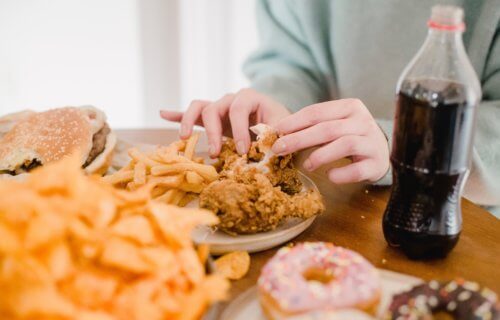We have all overeaten at some point. Sometimes, the pie at Thanksgiving is too good not to go back for seconds. However, binge eating is different. It’s a lot more serious than just eating a few more chips than you normally would. Binge eating disorder (BED) involves eating unusually large amounts of food and feeling like you can’t turn the switch off.
Are there signs of binge eating?
Some common behaviors and feelings can include:
- Feeling like you “have” to eat everything because it’s right in front of you, not feeling any signal telling you to stop.
- Eating mass amounts of food without truly being hungry for it.
- Eating an excessive amount of food quickly within a short timeframe, or even over the span of a couple of hours. (Example: Eating a dozen doughnuts in one sitting)
- Feeling sick to your stomach from everything you ate and how quickly you did it.
- Often eating alone or behind closed doors. (Example: Sneaking your takeout upstairs to your room so that nobody can see everything you bought to eat by yourself)
When we think of eating disorders, we typically think about anorexia and bulimia, but BED is very prevalent. Unlike anorexia, binge eating doesn’t involve typically being of a lower body weight and being obsessive about restricting calories. Sometimes, people with the disorder might try to restrict and then end up binging as a response. Additionally, most people with this disorder are either at a normal weight or are overweight or obese. It also differs from bulimia as people with BED generally don’t try to vomit what they consumed, use laxatives, or exercise excessively to “make up” for it.

Top reasons people start binge eating
- A history of yo-yo dieting
“Diet” and “dieting” are two different things. A diet should only describe food consumption in its most generic form. Dieting describes restricting one’s intake, often in an attempt to lose weight. Eating a healthy, balanced diet is the most sustainable way to lose weight and practice healthy living in a way that lasts. Restriction opens you up to being more likely to binge on food by causing you to feel so overwhelmed that you burst and eat way more than you ever intended.
- Poor body image
For many, this ties into the first point. People with BED very often have poor self-esteem and view their bodies in a negative way. Then after binges happen, it becomes a continuous cycle because eating excessively makes someone feel even more shameful.
- Trauma
Whether it’s from abuse, grieving a death, or just a culmination of life stressors, emotional distress can heavily contribute to binge eating risk. People suffering from any of these may find relief through food, using it as an outlet for dealing with their emotions.

Overcoming BED
If you feel that you or someone you love might be struggling with binge eating disorder, there are resources available. Many people find relief by working with a registered dietitian who specializes in eating disorders, as well as a therapist.
Additionally, keeping a food diary has shown to be helpful for some. It allows one to record what they ate and the feelings associated with it to better understand eating patterns and identify why it may be happening. It is also important that during recovery, you talk to family, friends, or anyone you trust. This holds you accountable while always keeping the door open for support whenever you need it.
Resources to help with eating disorders
The National Eating Disorders Association has several resources that share information and treatment options:
- General information about eating disorders: https://www.nationaleatingdisorders.org/what-are-eating-disorders
- Treatments: https://map.nationaleatingdisorders.org/
- Free and low-cost support: https://www.nationaleatingdisorders.org/free-low-cost-support
- Eating disorder risk screening: https://www.nationaleatingdisorders.org/screening-tool

